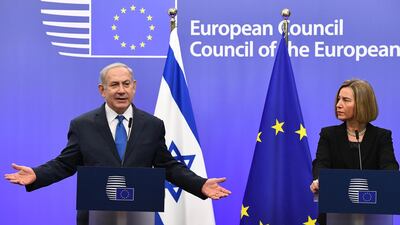Israeli prime minister Benjamin Netanyahu called on Monday for all European countries to move their embassies from Tel Aviv to Jerusalem, but faced a setback as EU ministers said they were not on board.
The Czech Republic, the one country that had considered following Donald Trump's lead, rowed back from the position during the Brussels summit, indicating it did not want to damage the Palestinian position.
"I believe that all, or most, European countries will move their embassies to Jerusalem, recognise Jerusalem as Israel's capital and engage robustly with us for security, prosperity and peace," he said during a visit to Brussels for a meeting with EU foreign ministers.
EU’s foreign policy chief Federica Mogherini said that the EU’s position on Jerusalem remains the “international consensus”.
"We believe that the only realistic solution to the conflict between Israel and Palestine is based on two states with Jerusalem as the capital of both," she said.
The Israeli premier’s visit comes after US president Donald Trump’s announcement to recognise Jerusalem as the capital of Israel.
Mr Trump also said that he has directed the US state department to begin preparations to move the US embassy in Israel to the disputed city, which sparked outrage and protests across the Middle East.
EU ministers have said they disapproved of Mr Trump’s move, and even Israel’s closest European allies, such as the Czech Republic, warned that the US president’s decision was bad for peace efforts.
Asked by reporters about Mr Trump's decision to relocated the US embassy to Jerusalem, Czech foreign minister Lubomir Zaoralek said: "I'm afraid it can't help us," he said. “I‘m convinced that it is impossible to ease tension with a unilateral solution. We are talking about an Israeli state, but at the same time we have to speak about a Palestinian state.”
France said that Jerusalem's status could only be agreed in a final deal between Palestinians and Israelis. Mr Netanyahu met with French President Emmanuel Macron on Sunday.
Last week, the Czech foreign ministry said it would begin considering moving the Czech embassy from Tel Aviv to Jerusalem, which many in Israel saw as an endorsement of Mr Trump's move.
But Prague later said it accepted Israel's sovereignty only over West Jerusalem.
_______________
Read more:
Palestinians to snub Pence during visit over Jerusalem move
UAE will remain 'firm supporter of the Arab identity of Jerusalem', cabinet says
Arab states urge US to abandon Jerusalem move
_______________
EU foreign ministers reiterated the EU position that the lands Israel has occupied since a 1967 war — including the West Bank, East Jerusalem and the Golan Heights — are not part of the internationally recognised borders of Israel.
Meanwhile, France's foreign minister Jean-Yves Le Drian urged Washington to come forward with peace plans that are being drawn up by Jason Greenblatt, Mr Trump's Middle East envoy, and Mr Trump's son-in-law and senior adviser, Jared Kushner.
"We've been waiting already for several months for the American initiative and if one is not forthcoming, then the European Union will have to take the initiative," Mr Le Drian said.
Ms Mogherini reiterated the EU’s commitment to a two-state solution, adding that the EU would step up its peace efforts and would hold talks with Palestinian president Mahmoud Abbas next month.
A demonstration condemning Mr Netanyahu's visit was planned for later in Brussels.

